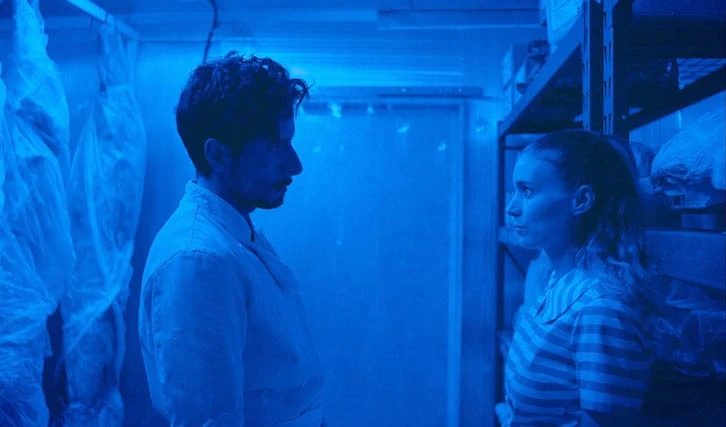Alonso Ruizpalacios: A Master of Mexican Filmmaking
Alonso Ruizpalacios, born in 1978, is renowned as one of the most versatile directors in Mexico. His films “Güeros” (2014), “Museo” (2018), and “Ein Polizei-Film” (2021) have garnered recognition from audiences in Germany as well. His latest work, “La Cocina – Der Geschmack des Lebens,” marks his first film set outside Mexico, premiering at the Berlinale competition last year and now gracing German cinemas since January 16.
The Story So Far:
In “La Cocina,” Ruizpalacios delves into the poignant narrative of work in late capitalism, exploring timeless themes that transcend eras. The film’s black-and-white cinematography sets a tone of ambiguity, blurring the lines between past and present. The story unfolds against a backdrop of social and ethnic contrasts, inviting viewers to reflect on societal disparities. As the plot progresses, color emerges as a dramatic element, enhancing the film’s visual impact.
Exploring the American Dream:
Ruizpalacios skillfully navigates the complexities of the American Dream, portraying protagonist Pedro’s journey from aspiration to disillusionment. The film poignantly illustrates the unattainable nature of this dream, particularly for marginalized individuals like Pedro, whose struggle for belonging and legal status mirrors a harsh reality faced by many.
Migration, Identity, and Society:
Set in a bustling kitchen where diverse cultures converge, “La Cocina” mirrors the intricate dynamics of Mexican-American relations. The film delves into the deep-rooted yearning for all things American, shedding light on the shared struggles of both Mexican and American laborers. Through nuanced storytelling, Ruizpalacios unravels the myth of the American Dream, revealing its pitfalls and the systemic exploitation it perpetuates.
The Culinary Crucible:
Within the culinary realm of “La Cocina,” Ruizpalacios crafts a microcosm of capitalist society, where productivity reigns supreme. The kitchen serves as a pressure cooker of cultural clashes and social hierarchies, echoing the relentless pursuit of efficiency in a capitalist world. Drawing inspiration from Arnold Wesker’s play “The Kitchen,” the film portrays a setting devoid of dreams and personal fulfillment, emphasizing the harsh realities of labor exploitation.
Theatrical Adaptation and Character Dynamics:
Ruizpalacios pays homage to Arnold Wesker’s seminal play by adapting its core themes to a Mexican context, shedding light on migration patterns and societal constructs unique to the region. The film’s ensemble cast, comprising a multinational array of characters, reflects the intricate web of relationships within the culinary landscape. Through meticulous casting and immersive rehearsals, the film captures the essence of collective struggle and resilience.
Conclusion:
“La Cocina – Der Geschmack des Lebens” stands as a poignant reflection on labor, migration, and the elusive nature of the American Dream. Ruizpalacios’ masterful direction and nuanced storytelling breathe life into a narrative that transcends borders and resonates with audiences on a global scale.
Frequently Asked Questions:
1. What inspired Alonso Ruizpalacios to film “La Cocina” in black and white?
Ruizpalacios’s decision to opt for black-and-white cinematography was driven by a desire to create a timeless ambiance that blurs temporal boundaries, emphasizing the film’s thematic depth.
2. How does “La Cocina” explore the American Dream?
The film offers a poignant portrayal of the American Dream, highlighting its unattainable nature and the hardships faced by individuals like Pedro in their pursuit of this elusive ideal.
3. What role does humor play in “La Cocina”?
Humor serves as a narrative tool in the film, offering moments of levity amidst the weighty themes of exploitation and marginalization, showcasing the characters’ resilience in the face of adversity.
4. What inspired the magical ending of “La Cocina”?
The film’s enigmatic conclusion reflects Ruizpalacios’s artistic vision, symbolizing Pedro’s transcendence and Estela’s witness to his transformative journey, leaving the audience with a sense of wonder and introspection.
5. How does “La Cocina” adapt Arnold Wesker’s play “The Kitchen”?
Ruizpalacios’s adaptation of Wesker’s play infuses Mexican cultural nuances into the narrative, reimagining the original text to resonate with contemporary migration patterns and societal dynamics.
6. What thematic elements does “La Cocina” explore through its characters?
The film delves into themes of identity, migration, and societal hierarchy, using a diverse ensemble cast to illustrate the complexities of cultural assimilation and labor exploitation.
7. How does “La Cocina” depict the realities of the culinary industry?
Through its portrayal of a bustling kitchen environment, the film sheds light on the harsh realities of labor exploitation, emphasizing the relentless pursuit of productivity in a capitalist society.
8. What challenges did Alonso Ruizpalacios face during the casting process?
The director navigated a complex casting process to assemble a multicultural ensemble cast, ensuring a harmonious blend of characters from diverse backgrounds, reflecting the film’s thematic depth.
9. How does “La Cocina” challenge traditional notions of the American Dream?
The film subverts conventional ideals of the American Dream, depicting its elusive nature and the cyclical patterns of exploitation that perpetuate systemic inequalities.
10. What message does “La Cocina” convey about migration and society?
“La Cocina” underscores the interconnectedness of migration and societal structures, highlighting the ways in which diverse cultures intersect within the culinary landscape, shaping individual identities and collective experiences.
Tags: Alonso Ruizpalacios, La Cocina, Mexican cinema, American Dream, migration, labor exploitation, cultural diversity, Arnold Wesker, cinematic adaptation, ensemble cast

